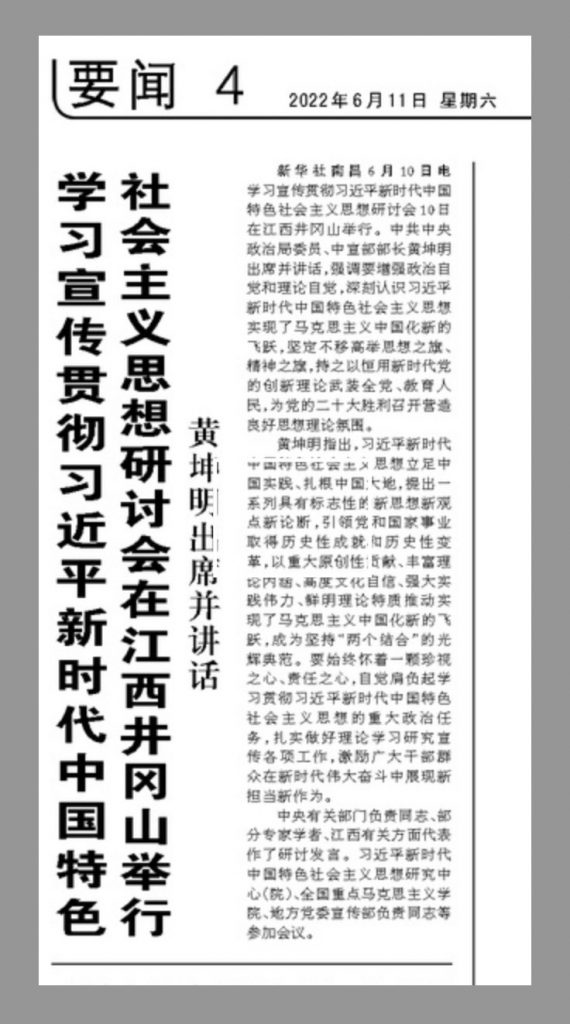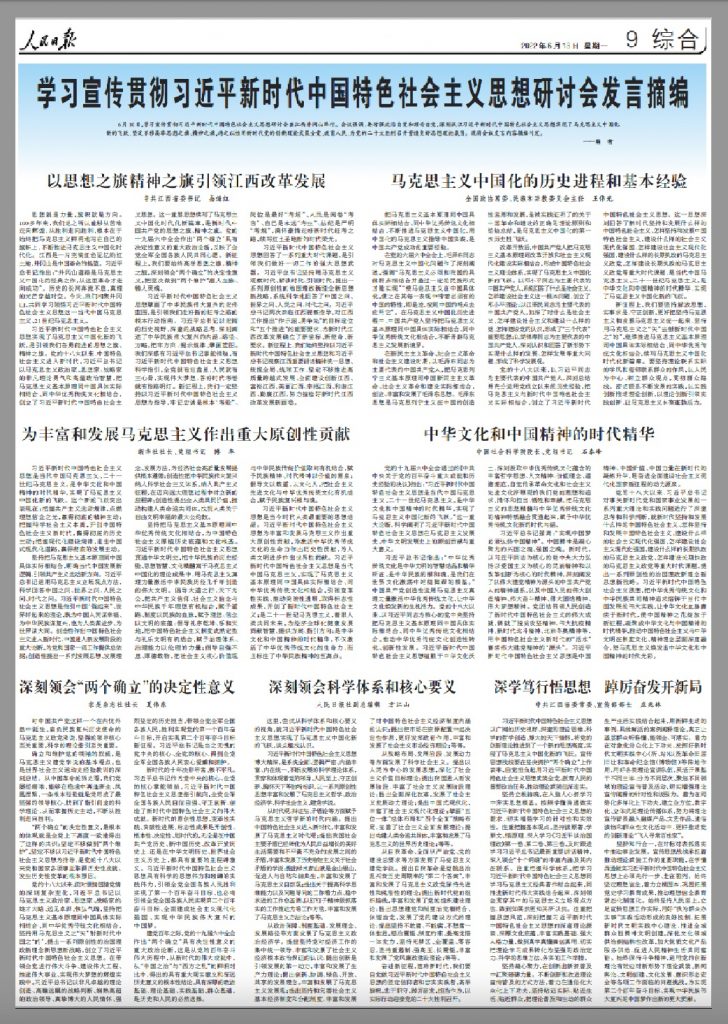
With the 20th National Congress of the Chinese Communist Party just months away, we can expect to divine certain shifts in the official discourse at the highest levels. It is a time of speculation and uncertainty. Like anxious spectators in St. Peter’s Square, watching the tiny chimney atop the roof of the Sistine Chapel, we can only fix our eyes on the People’s Daily. White smoke. Black Smoke.
This may seem an imperfect analogy. But China’s politics are as sealed as a conclave. And no one reading the party-state media closely these days can fail to note the devotional quality of much of the language.
The China Media Project has noted previously that one of the most important shifts to observe is the continued elevation of that unwieldy banner term, “Xi Jinping Thought on Socialism with Chinese Characteristics for the New Era.” For the general secretary to be “crowned” this way in 2017, with the inclusion of his name in a guiding ideology written into the Party Charter, was no small achievement. But the man’s ambition is for Mao-style pontifical grandeur, and he surely covets the condensed “Xi Jinping Thought” (习近平思想) – a rhetorical gem to secure his power and prestige.
So, what news from the conclave? Is the discourse moving Xi Jinping further toward his crowning achievement?
Holding the Keys to Marxism
Over the weekend and into this week, several smoke signals of interest have emerged. June 11 brought the first wisps in the form of a page-four article in the People’s Daily relaying recent remarks made from Huang Kunming (黄坤明), director of the Central Propaganda Department and a close associate of Xi’s.
In a speech to a forum in Jiangxi province last Friday on the study and implementation of “Xi Thought” (my shortening), Huang reportedly said that the banner concept is “based on Chinese practice and rooted in Chinese soil,” and that it “has put forward a series of landmark new ideas, new perspectives and new assertions, leading the Party and the state in making historic achievements and changes.” Xi’s theories had not only laid the foundation for change in China, but amounted, said Huang, to “a new leap in the Sinicization of Marxism.”

The significance of Huang’s remarks lies in the act of flattery itself. This is a textbook example of what is called in Chinese biaotai (表态), or “loyalty signaling.” While it is something we have seen from a number of local CCP leaders in recent months, Huang Kunming’s act of biaotai is more senior-level – exactly the sort of thing we should expect to see, barring a reversal of fortunes for Xi, as the CCP Congress draws nearer.
China’s politics are as sealed as a conclave. And no one reading the party-state media closely these days can fail to note the devotional quality of much of the language.
But the emphasis on Xi as an innovator of Marxism deserves attention too. It is an important aspect of the man’s progressive elevation beyond the grasp of worldly politics, and into the spiritual realm of historic greatness. Just as Mao’s adaptation of Marxism to local conditions made possible an historic victory in the “new democratic revolution,” so too does Xi’s bold innovation of Marxism in the 21st century mark him as a revolutionary leader in his own right, with the theoretical heft needed to meet the challenges of a “New Era.”
We are accustomed to talking of “Xi Jinping Thought” as an act of crowning, or guanming (冠名). But this claim to Marxist innovation is more than earthly; it is spiritual. It promises transcendence beyond the untidy plane of immediate politics and policy. Two years ago, He Yiting (何毅亭), the deputy director of the Central Party School, went so far as to claim on the front page of the Study Times journal that Xi Jinping’s banner term was not only a fresh vision of Chinese Marxism, but in fact “Marxism for the 21st century.”
Huang Kunming’s is one important voice from the conclave. And if Xi Jinping can manage to be anointed as the pontiff of global Marxism – as the keeper of the keys – then he becomes far more difficult to touch.
Xi Jinping in the Soul
The propaganda chief’s bow to the general secretary was followed on Monday by a full-page spread in the People’s Daily that delivered the complimentary remarks of a further six senior CCP officials. These too had been made at the Jiangxi forum. A note introducing them stressed that understanding the immensity of “Xi Thought” was a crucial matter of “enhancing political and theoretical consciousness” for CCP members.

Leading the group of kingmakers was Yi Qinhong (易炼红), the top Party leader of Jiangxi province, and the local host of the event. The subhead announcing Yi’s remarks could hardly have been clearer in its signaling simultaneously of the need for both the crown and the halo. “Leading the Reform and Development of Jiangxi with the Banner of Thought and the Banner of Spirit,” it read.
“Ideas are power, and banners are direction,” the tribute began. Here it was again, the dualism of loyalty and faith so essential to the elevation of Xi Jinping.
For some, this pairing may be familiar as encoded in another key phrase, the “Two Establishes” (两个确立). That phrase emerged during the Sixth Plenum last year, which brought the CCP’s powerful third resolution on its history. One important passage read:
For the Party to establish the status of Comrade Xi Jinping as the core of the Party’s Central Committee and of the whole Party, and to establish the guiding role of Xi Jinping Thought on Socialism with Chinese Characteristics for the New Era, expresses the deepest wishes of the whole Party, the whole military, and the peoples of the whole country.
This language encodes the dual necessity of power in two unshakeable principles: 1) that Xi Jinping must be the single, unquestionable leader of the Party, and that 2) his ideas must be taken as the Party’s gospel, the source of its legitimacy in the 21st century.
It is no surprise, therefore, when Yi Qinhong says, with all the reverence of a supplicant, that we must “profoundly comprehend the decisive significance of the ‘Two Establishes.'” Immediately after, he stresses that the “Two Safeguards” (两个维护) – the preservation of Xi’s “core” status and CCP rule – should “enter our veins, and be cast into our souls.”
Great Leaps for Marxism
Huang Kunming spoke about “Xi Thought” as “a new leap in the Sinicization of Marxism.” In the joint remarks appearing on Monday in the People’s Daily, every one of these powerful men spoke of the same “leap,” or feiyue (飞跃) – which might also be translated “breakthrough.” In this they were taking their cues again from the November resolution, which uses the word to mark the immense significance of Xi’s ideas.
Printed just to the right of Yi Qinhong’s remarks were those of Wang Weiguang (王伟光), a member of the Standing Committee of the National Committee of the Chinese People’s Political Consultative Conference (CPPCC). Mao Zedong, said Wang, had made the “first historic leap in the Sinicization of Marxism,” followed by the key leaders of the reform era, Deng Xiaoping, Jiang Zemin and Hu Jintao. These three are huddled together in Wang’s remarks, reducing their collective stature. Xi Jinping, meanwhile, is in a league of his own. Since the 18th National Congress of the CCP in 2012, we are told, Xi has achieved, single-handedly, yet another “new leap” in the Sinicization of Marxism.
There are few notable differences in the substance of the six tributes. But the crucial point is the ceremony itself. When Fu Hua (傅华), the newly-appointed president and CCP chief of Xinhua News Agency, makes the grandiose claim in the next speech that “Xi Jinping Thought” is the “most important crystallization of human thought in our time,” this is not the conviction of a thinker; it is the declaration of a man of faith.
Fu is followed at Xi Jinping’s feet by Shi Taifeng (石泰峰), the top official at the Chinese Academy of Social Sciences (CASS); Xia Weidong (夏伟东), the publisher of Seeking Truth journal (which for months on end has dutifully headlined itself with Xi wisdom); Fang Jiangshan (方江山), deputy editor-in-chief of the People’s Daily; and Zhuang Zhaolin (庄兆林), the head of the provincial propaganda department of Jiangxi.
Practical Acts of Deference
The forum in Jiangxi, dealing topically with “Xi Jinping Thought,” was an opportunity for collective biaotai. But similar acts of obeisance should follow across the country as the fall Congress draws nearer. And there were further hints on Tuesday, as Li Qiang (李强), Shanghai’s top leader and long a close ally of Xi, hosted a forum to celebrate past visits to the city by the general secretary.
A readout of the event posted the same day on the government’s official WeChat public account, “Shanghai Release” (上海发布), stressed the need to “steadily enhance loyalty to the ‘Two Establishes,’” “maintaining a high-level of uniformity in thought, politics and action with the CCP Central Committee with Comrade Xi Jinping as the core.”
It was essential, said Li Qiang, for officials to “take practical action to greet the successful opening of the 20th Party Congress.” His act of loyalty signaling this week was an example of practical action. So far, he has seemed unbruised, at least within the Party, by the extreme failures of the lockdown in Shanghai. His fortunes will be something to observe closely as the year progresses. Will his deference to Xi be repaid, or will he be viewed as a liability?
Acts of deference and reverence should continue apace in the coming weeks, as we cross the threshold of the July 1 CCP anniversary (expect robust commemoration of last year’s commemoration) and head toward the Congress that could decide the direction of Chinese politics for a generation to come.
Acts of deference and reverence should continue apace in the coming weeks, as we cross the threshold of the July 1 CCP anniversary.
In another hint of smoke yesterday, Le Yucheng (乐玉成), the new head of the National Radio and Television Administration (NRTA), emphasized the imperative of loyalty to Xi Jinping when he said that officials must “focus on the core, maintain the core, and promote the core.” This again might have been a practical act of loyalty signaling. Until recently, Le was a deputy minister of foreign affairs. His sudden move to the NRTA could be read as a demotion, suggesting his work in the foreign ministry had left something to be desired.
At such political moments, acts of faith and contrition befit the acolyte. And so Le Yucheng said at the training session that it was important for his ministry, overseeing the ideological fronts of television and radio, to steadily lift its chin to the heavens, acting as “a firm believer and active disseminator of the latest theoretical achievements in the Sinicization of Marxism.”




















